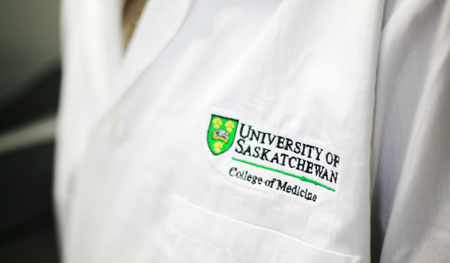
U of S College of Medicine succeeds in national residency match
Eighty-three students are expected to graduate this June with an MD degree from the University of Saskatchewan’s College of Medicine and go on to pursue postgraduate training.
By Laura HermanEighty-three students are expected to graduate this June with an MD degree from the University of Saskatchewan’s College of Medicine and go on to pursue postgraduate training.
Yesterday, these physicians learned which medical specialty they will practice, and where the next phase of their training will take place. This annual process of matching medical graduates to available residency training positions across the country is known as the Canadian Resident Matching Service (CaRMS).
Fifty-seven percent of 2015 College of Medicine graduates have matched to residency training programs at the University of Saskatchewan. Twenty-four percent of this graduating class matched to family medicine residency training programs located in Saskatoon, Regina, Prince Albert, La Ronge, Swift Current, North Battleford and Moose Jaw.
“I am very encouraged by our 2015 CaRMS results. To see so many of our graduates match to Saskatchewan programs and to highly-competitive positions across the country, reinforces to me the exceptional nature of our students,” said Dr. Preston Smith, dean of the College of Medicine. “I am especially pleased to see that all of Saskatchewan’s forty-three family medicine training positions have been filled.”
“I am pleased with this year’s CaRMS results,” Rural and Remote Health Minister Greg Ottenbreit said. “We value our locally trained physicians, especially those who chose to practice in our province’s rural communities, as Saskatchewan residents will benefit from their training and expertise.”
Increasing the number of Saskatchewan grads choosing family medicine residency training has been an important goal for the College of Medicine. In 2015, 20 U of S graduates matched to family medicine programs in Saskatchewan, up from 18 graduates in 2014 and 10 graduates in 2010.
“This is great news,” said Dr. Dennis Kendel, CEO of saskdocs (Physician Recruitment Agency of Saskatchewan). “It is quite evident that the locations where medical residents complete their medical residencies are usually the same locations where they decide to establish their medical practice, lay down roots and begin to integrate with communities around them. We look forward to working with the University of Saskatchewan’s College of Medicine on improving future matches and with the residents to help connect them with the right opportunities.”
In addition, 34 U of S graduates from the class of 2015 have matched to programs in medical schools outside Saskatchewan, including Dalhousie, McGill, McMaster, Queen’s and Western Universities and the Universities of Alberta, British Columbia, Calgary, Manitoba, Ottawa and Toronto. Two students are unmatched at this time.
Students graduating with an MD degree must proceed to postgraduate medical education training (residency), which involves two to five years of further training before they are eligible to receive a full license to practice medicine.
There are a defined number of residency positions available in Canada, and graduating medical students must compete with their peers from across the country to secure spots in their chosen field of specialty.
